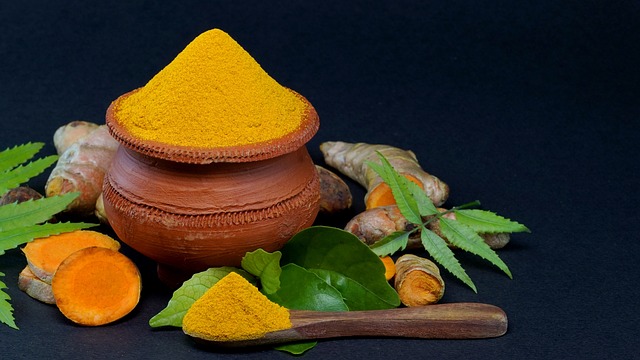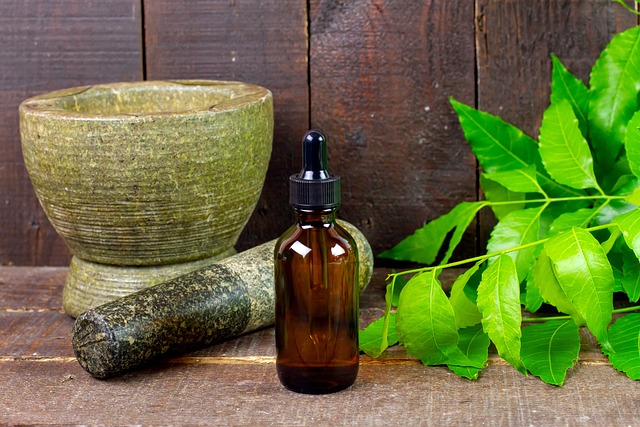-By: Bhavisha Changrani
Neem (Azadirachta indica) is often called a “miracle tree” due to its wide-ranging health benefits. Native to the Indian subcontinent, neem has been used for thousands of years in traditional medicine, particularly in Ayurveda, to treat various ailments and promote overall health. In recent years, scientific studies have further supported many of these traditional uses, confirming neem’s role as a powerful natural remedy. This article explores the various health benefits of neem and how it can improve skin, hair, digestion, immunity, and more.

Neem for Skin Health: A Natural Solution for Acne and Eczema
Neem is renowned for its powerful anti-inflammatory, antimicrobial, and antioxidant properties, making it an excellent natural remedy for a variety of skin conditions. The leaves, oil, and extracts are used in many skincare products to treat acne, eczema, psoriasis, and other inflammatory skin conditions. Here’s how neem benefits the skin:
Acne Treatment
Neem’s antibacterial and anti-inflammatory properties help prevent and treat acne by killing acne-causing bacteria and reducing inflammation. It also helps balance oil production, reducing the chances of clogged pores.
Eczema and Psoriasis
Relief: Neem’s ability to reduce skin inflammation and irritation makes it beneficial for conditions like eczema and psoriasis. The soothing effect of neem can alleviate itching, redness, and swelling.
Wound Healing
Neem has a long history of use in promoting faster wound healing due to its antimicrobial properties. It helps prevent infections and supports tissue regeneration.
To use neem for skin care, you can apply neem oil directly or use products like neem soap, which cleanse the skin without harsh chemicals.
Boosting Immunity with Neem
Neem has immune-boosting properties that can help strengthen the body’s defenses against infections and diseases. Research has shown that neem contains compounds that enhance the body’s immune system by stimulating white blood cell production and improving the body’s ability to fight off harmful pathogens.
Fighting Infections
Neem’s antibacterial, antiviral, and antifungal properties make it a potent natural remedy for combating infections. Regular use of neem helps the body ward off common illnesses like colds, flu, and digestive infections.
Anti-inflammatory Action
Chronic inflammation is linked to many health conditions, including autoimmune diseases and cancer. Neem helps modulate inflammation in the body, reducing the risk of these diseases.
Drinking neem tea or taking neem supplements can help support the immune system naturally.

Neem for Digestive Health
Neem has long been used to treat digestive issues, such as indigestion, bloating, and constipation. Its antibacterial and anti-inflammatory properties support the digestive system in several ways:
Detoxification
Neem helps detoxify the liver and intestines, promoting smoother digestion and better nutrient absorption. It also supports healthy bile production, which aids in fat digestion.
Gut Health
Neem’s antibacterial properties help balance gut bacteria, preventing overgrowth of harmful microbes and promoting a healthy microbiome. This can improve digestion and reduce symptoms of bloating, gas, and discomfort.
Parasite Control
Neem is traditionally used as a natural dewormer. It can help expel intestinal parasites, improving gut health and preventing issues like diarrhea or malnutrition caused by parasites.
Neem supplements or neem powder can be added to your diet to improve digestive health.

Neem for Hair Health: Combatting Hair Loss and Scalp Issues
Neem oil and neem extracts are widely used in hair care products because of their ability to improve scalp health, reduce dandruff, and promote hair growth. Here’s how neem benefits hair:
Fighting Dandruff
Neem has antifungal properties that help combat dandruff-causing fungi. Regular scalp massages with neem oil can prevent the growth of dandruff, leaving the scalp clean and refreshed.
Promoting Hair Growth
Neem’s ability to improve circulation in the scalp and its anti-inflammatory properties can help stimulate hair follicles and promote hair growth.
Prevention of Hair Loss
Neem oil helps balance sebum production on the scalp, reducing hair thinning caused by oily or dry scalp conditions. It helps in avoiding scalp infections, which can contribute to hair loss.
Massaging neem oil into the scalp or using shampoos containing neem extract can help promote healthier, thicker hair.
Neem for Blood Sugar Control: A Natural Aid for Diabetes
Recent studies suggest that neem may play a role in controlling blood sugar levels, making it a valuable herb for people with diabetes. It is believed that neem helps regulate insulin levels and improve glucose metabolism.
Blood Sugar Regulation
Neem has been shown to enhance the secretion of insulin and improve glucose uptake by cells, which helps lower blood sugar levels.
Antioxidant Protection
Diabetes often leads to oxidative stress, which can damage cells and tissues. Neem’s antioxidants help protect against this damage, reducing the risk of complications from diabetes.
Incorporating neem into a diabetes management plan, such as through neem supplements or tea, may offer a natural way to regulate blood sugar levels.
Neem for Anti-Aging: Natural Skin Protection
Neem is rich in antioxidants, which help protect the skin from free radical damage. The breakdown of collagen and elastin fibers by free radicals contributes to skin aging, causing wrinkles, fine lines, and sagging.
Here’s how neem helps:
Collagen Production
Neem promotes collagen synthesis, helping the skin maintain its firmness and elasticity.
UV Protection
Neem’s antioxidants protect the skin from harmful UV rays, reducing the risk of sunburn, pigmentation, and premature aging.
Fighting Wrinkles
The anti-inflammatory properties of neem help reduce the appearance of wrinkles and fine lines, promoting youthful skin.
Using neem oil or skincare products with neem extract can help protect and rejuvenate the skin.

Neem for Detoxification and Liver Health
Neem is an effective detoxifying herb that supports liver function. The liver plays a crucial role in processing toxins, and neem helps enhance its ability to filter out harmful substances from the body.
Liver Protection: Neem helps protect liver cells from damage caused by toxins, alcohol, and other environmental pollutants. It also encourages the production of liver enzymes that aid in detoxification.
Blood Purification
Neem has blood-purifying properties that help eliminate toxins from the bloodstream, which in turn supports overall health.
Neem supplements or neem tea can aid in liver detoxification and maintain healthy liver function.
Neem for Mental Health: Stress Reduction and Cognitive Function
Neem also has adaptogenic properties, which means it can help the body adapt to stress. Neem has been shown to have a calming effect on the nervous system, which can help reduce anxiety and stress.
Anxiety and Depression Relief
Neem’s calming effects can help alleviate symptoms of anxiety and mild depression. By balancing neurotransmitters in the brain, neem supports emotional well-being.
Improved Cognitive Function
Neem has neuroprotective properties that can help improve memory and cognitive function, making it a valuable herb for mental clarity and focus.
Regular use of neem supplements or neem tea may contribute to a calm and balanced mind.
Neem for Heart Health: Supporting Cardiovascular Function
Neem has been shown to benefit heart health due to its anti-inflammatory, antioxidant, and cholesterol-lowering properties. Here’s how neem supports cardiovascular function:
Lowering Cholesterol
Neem helps reduce levels of “bad” LDL cholesterol and increases “good” HDL cholesterol in the bloodstream, which can contribute to a healthier heart.
Reducing Inflammation
Chronic inflammation is a key contributor to heart disease. Neem’s anti-inflammatory properties help reduce inflammation in the blood vessels, preventing the buildup of plaque that can lead to atherosclerosis (hardening of the arteries).
Regulating Blood Pressure: Neem has mild blood pressure-lowering effects, which can help manage hypertension and reduce the risk of heart attacks and strokes.
By including neem in your routine, whether in the form of supplements or tea, it may help improve heart health and reduce the risk of cardiovascular issues.
Neem for Respiratory Health: Treating Asthma and Allergies
Neem is known to support respiratory health, particularly in managing conditions like asthma, allergies, and bronchitis. Its anti-inflammatory and antimicrobial properties can have a significant positive impact on lung function:
Asthma Relief
Neem’s ability to reduce inflammation in the airways helps alleviate the symptoms of asthma, such as wheezing, coughing, and shortness of breath. It may help prevent asthma attacks by calming the immune response that triggers inflammation.
Treating Allergies
Neem’s natural antihistamine effects can help reduce allergy symptoms like sneezing, nasal congestion, and itchy eyes. It works by regulating the body’s immune response and reducing allergic reactions.
Clearing Respiratory Infections
The antimicrobial properties of neem help fight off respiratory infections, including bronchitis and sinusitis, by combating bacteria, fungi, and viruses that affect the respiratory tract.
Consuming neem in the form of supplements, tea, or using it in steam inhalations can help improve respiratory health and provide relief from asthma and allergies.

Conclusion
Neem is a powerful herb with a wide array of health benefits that support the body inside and out. From promoting clear skin to supporting digestive health, boosting immunity, and even protecting the liver, neem is a versatile natural remedy. Whether you choose neem in the form of oil, supplements, or teas, incorporating this ancient herb into your wellness routine can help you maintain better health and prevent various ailments.
However, while neem is generally considered safe, it is always advisable to consult with a healthcare professional before starting any new supplement or herbal regimen, especially if you are pregnant, nursing, or taking prescription medications.













